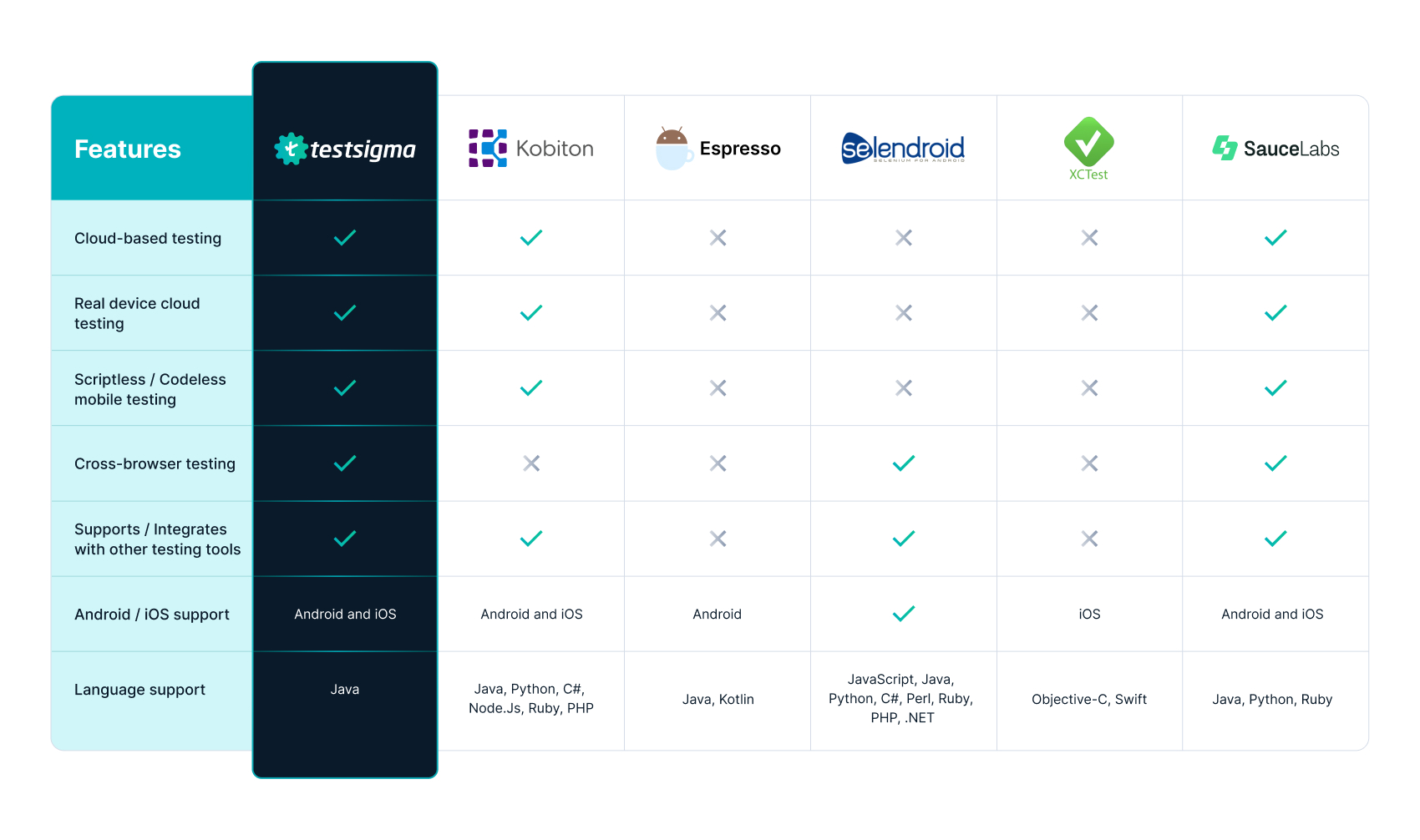Start automating your tests 5X Faster in Simple English with Testsigma
Try for freeAppium is one of the most renowned automated testing tools for creating and running tests on mobile platforms such as iOS and Android. However, as technology evolves and project requirements vary, exploring Appium alternatives becomes essential to meet diverse testing needs efficiently. There are so many top alternatives to Appium that can make your testing experience more efficient. In this blog, we have curated a list of the top Appium alternatives that will meet your testing requirements just as well, if not significantly better than Appium.
Table Of Contents
What is Appium?
Appium is an open-source test automation framework designed for automating mobile testing on various platforms, including Android, Windows, and iOS. It allows testers to write and execute automated test scripts for native, hybrid, and mobile web applications using Java, Python, JavaScript, Ruby, and C#.
Appium can also use the WebDriver Protocol to provide a unified API for cross-platform mobile testing. All these features make Appium a versatile and powerful tool for upholding app quality and consistency across different devices and OS.
Reasons for Finding Appium Alternatives
Despite Appium being a popular tool for mobile app testing, it still has a few drawbacks and legacy approaches toward automation testing. Many modern testing tools are addressing these limitations and emerging as worthy alternatives to Appium with the motto, “fast development, faster testing.”
Let’s look at some of the characteristics of Appium that require an alternate:
- Appium can be challenging to set up and configure for mobile testing, especially for beginners.
- It has a client-server architecture and WebDriver dependency, making it slow compared to other modern mobile testing tools.
- Appium tests are prone to flakiness, which can lead to inconsistent results due to timing issues, network conditions, or device-specific quirks.
- You require physical devices or a device cloud service to run tests on real devices, which accumulates considerable cost over time.
- While Appium supports basic gestures, it struggles with complex, multi-touch gestures or more intricate interactions.
- Appium lacks integrated test management features and requires additional tools and frameworks to handle test data management, reporting, and continuous integration.
How to Choose the Right Appium Alternative?
Multiple factors are involved in choosing the right Appium alternative. From aligning that tool to your team’s skill set to integrating it into your existing bundle of tools, here are some key aspects to consider:
- Ensure the alternative tool supports all the platforms you need to test, such as iOS, Android, and web applications for cross-platform testing.
- Consider the tool that is easy to set up and install. It should have a user-friendly interface, good documentation, and a supportive community.
- Evaluate the tool’s performance, including execution speed and resource usage for faster test execution.
- Ensure the tool can handle advanced testing requirements such as complex gestures, interactions, and support for various device configurations and orientations.
- Choose a tool that integrates smoothly with your existing CI/CD pipeline and other tools in use, such as test management systems, reporting tools, and version control systems.
- Assess the cost of the tool, including licensing fees, maintenance costs, and any additional infrastructure required.
- Check if the tool allows for easy creation and reuse of test components to significantly reduce the time spent on maintaining and updating tests.
- Ensure the tool can scale with your testing needs and effortlessly handles a growing number of tests, supports parallel test execution, and works with both local and cloud-based testing environments.
6 Best Appium Alternatives List
While Appium has long been a popular choice for mobile test automation due to its flexibility and open-source nature, there are several other compelling alternatives to Appium on the market that are worth the time and cost. Some of the best Appium alternatives are as follows:
The table below depicts the key comparison between the top 6 Appium alternatives

1. Testsigma
Testsigma is a unified low-code test automation platform that allows you to automate mobile testing for both Android and iOS applications in one platform. It supports low-code testing techniques, such as NLP-based testing and Recorder, to test your mobile apps.
What makes it a better alternative to Appium? Let’s discuss them. Testsigma offers several test automation features for mobile testing, making it the best Appium alternative.
Some of the key features of Testsigma include,
- Create automated test cases in plain English using NLPs.
- Test your native, hybrid, and mobile web apps in one place.
- Testsigma is cloud-based, so you can create and run automated mobile tests on the cloud. No setup/installation is required.
- Supports web, mobile, desktop app, and API testing in one place. You don’t have to switch between multiple tools or frameworks to test your applications.
- Test your mobile apps across 3000+ real devices/tablets and 1000+ browser/OS combinations to ensure their functionality and responsiveness.
- Perform parallel testing across multiple environments
- Supports AI-driven auto-healing capability and built-in test case review management.
- Perform end-to-end functional testing of mobile apps and achieve high test coverage.
- Provides a Record feature to automate UI testing of mobile applications.
- Extended 24×7 technical customer support via chat, call, email, and community
- Seamlessly integrate your automated tests into the DevOps and CI/CD pipeline.
- Supports various third-party integrations with Jenkins, JIRA, Bamboo, Bugzilla, Azure DevOps, etc.
- You can achieve a good ROI using Testsigma’s scriptless test automation.
E2E Mobile Test Coverage – Test Over 2000+ Real Ios And Android Devices On Cloud With Zero Code With Testsigma
2. Kobiton
Kobiton is another alternative to Appium that allows developers and testers to perform functional testing and performance testing of web and mobile applications. It supports both scriptless and script-based testing. It is a bit pricey yet offers a great solution for automated testing.
Some of the key features of Kobiton include,
- Test on real-devices, cloud, or on-premise.
- Perform cross-platform and cross-browser testing for web and mobile apps
- Perform both manual and automated testing
- Test on real devices within the IDE to identify cross-platform issues
- Supports testing across 400+ real devices in both public and private cloud environments
3. Espresso
Espresso is an open-source test automation framework developed by Google. It allows you to automate UI testing for Android applications. It also supports black-box testing, but the developer/tester has to be completely aware of the codebase under test.
It is great for testing native applications and hybrid-web applications. It is a code-based testing framework. You can create test cases using Java or Kotlin.
Some of the key features of Espresso include,
- It supports features such as intent validations, synchronized test executions, and capabilities to run recipes.
- Espresso is integrated with Android Studio, which is the official IDE for Android app development. So, developers can easily code and test their UI in the same environment.
- It has an integrated test runner, so testers can run tests directly from the IDE.
4. Selendroid (Selenium for Android)
Selendroid is a widely used open-source test automation framework to automate Android app testing. It is a Selenium-based API that allows testers to interact with Android applications using the WebDriver. It supports testing both native and hybrid Android applications.
Some of the key benefits of Selendroid include,
- Supports testing across multiple browsers like Safari, Chrome, Edge, IE, Firefox, Opera, etc
- Use various programming languages to create code scripts like Java, JavaScript, Python, C#, Ruby, .NET, Perl, PHP, etc
- You can scale your test automation by integrating it with Selenium Grid or so.
- By integrating Selendroid with iOS drivers, you can test iOS applications as well.
- Selendroid, in integration with Selenium Grid, supports parallel test execution across multiple platforms and browsers.
- Open-source and available for free
- Has a very active community
5. XCTest
XCTest, by Apple, is a built-in mobile test automation framework that is integrated with XCode, which is the official IDE for developing Mac and iOS applications. It is a code-based testing framework that allows developers/testers to create and run automated test cases using Objective C or Swift.
Some of the key benefits of XCTest include,
- Since Objective C or Swift is the language stack for most Mac and iOS applications, developers can build code and run tests in the same environment, that is, XCode.
- No further setup or installation is needed, as the framework is completely integrated with XCode.
- It provides a Record feature for UI testing.
- It supports UI testing, unit testing, performance testing, and snapshot testing of iOS applications.
6. Sauce Labs
Sauce Labs is the last one on this list of Appium alternatives. Sauce Labs is a cloud-based testing platform that allows developers and QA to automate web and mobile app testing.
Some of the key features of Sauce Labs include,
- Supports testing across 2000+ real devices and 900+ browser/OS combos
- Perform continuous testing for web and mobile apps
- Supports cross-platform and cross-browser testing
- Supports visual regression testing
Conclusion
With the digital revolution, the need for smartphones and mobile applications increases every day. With that, the demand for quality and reliable mobile applications is also on the rise. Businesses need to invest in good testing platforms to ensure they ship quality products to their customers.
Choose a test automation tool that streamlines your testing process, improves efficiency, and delivers high-quality applications. Remember that the choice of tool depends on factors like project requirements, team expertise, testing needs, and budget.
Automate tests for native and hybrid apps – Android and iOS with Testsigma.
Frequently Asked Questions
1. Which is the best Appium alternative?
Testsigma is the best alternative for Appium as it allows you to easily test mobile apps, both Android and iOS, through a simple yet intuitive interface. It makes testing more accessible with its scriptless test automation for web, mobile, and desktop apps and APIs in the same platform.
2. Is Appium outdated?
Appium is not outdated, but it has its fair share of disadvantages when it comes to mobile testing. Modern scriptless test automation tools like Testsigma have changed the way mobile test automation works. Testsigma offers powerful mobile testing solutions that make it the best alternative for automating mobile app testing.








